Take a peek at just some of our highlights from 2021 – all made possible with the help of our wonderful members, supporters and volunteers.
Highlights from an incredible wildlife year
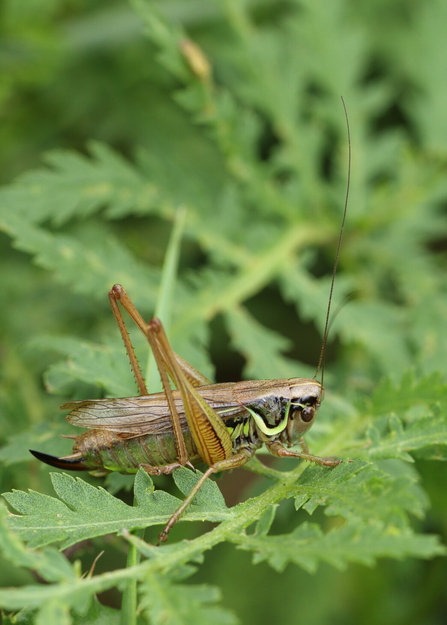
Roesel's bush cricket by Vaughn Matthews
New discoveries on the Kingfisher Trail
Connecting the West Pennine Moors to the urban centres of Bolton, Bury and Salford, the Kingfisher Trail is one of the most important wildlife areas in Greater Manchester. This year, it became even more important when volunteer, Joe Holt, discovered a new species for both Seven Acres Local Nature Reserve in Bolton and Philips Park in Bury.
At Seven Acres, eagle-eyed Joe spotted a Roesel's bush cricket during a grassland survey. Until the early 20th century this large cricket was only found on the South-East coast, but it has expanded its range in response to climate change and isn’t as fussy about its habitat – now found in urban wasteland, course grassland and marshy areas in addition to its favoured saltmarshes and dunes.
At Philips Park, Joe found a parasitic wasp that had never before been recorded in Greater Manchester. The large-spurred digger wasp is a parasitic species, laying her eggs in the burrows of other digger wasps before flying away and leaving her larvae to destroy the host wasps eggs and eat their food.
Joe said: “Spending time across Greater Manchester’s nature reserves with Lancashire Wildlife Trust has been a great opportunity to see some amazing species and habitats in my local area. Learning about them and sharing finds with other volunteers has been really rewarding, and knowing that two species new to Greater Manchester can be found so easily, just makes you wonder at what else might be out there waiting to be discovered.”
And it isn’t just Joe who has achieved amazing things at Philip Park in 2021:
- 76 volunteers joined our practical conservation sessions.
- Our volunteers engaged 703 people with the park through guided walks, self-guided walks and events.
- Our volunteer work group removed five acres of Himalayan Balsam.
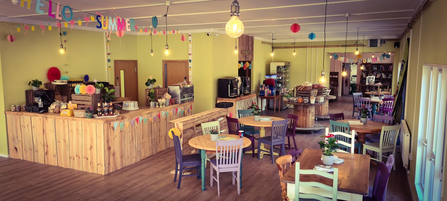
Ed Bailey
A new era at Mere Sands Wood
It seems a lifetime ago since a group of generous donors originally helped us fundraise to update the Mere Sands Wood visitor centre and add a lovely new café. Then came the pandemic, and we were delayed even further. However, our passionate team hung in there and, this year, we were finally able to open the new visitor centre to the public.
Fitted with Pilkington AviSafe™ glass to prevent bird strikes, and with gorgeous views over the reserve, the café is a peaceful place to relax with a hot drink, a sandwich or a piece of cake during your wildlife walk.
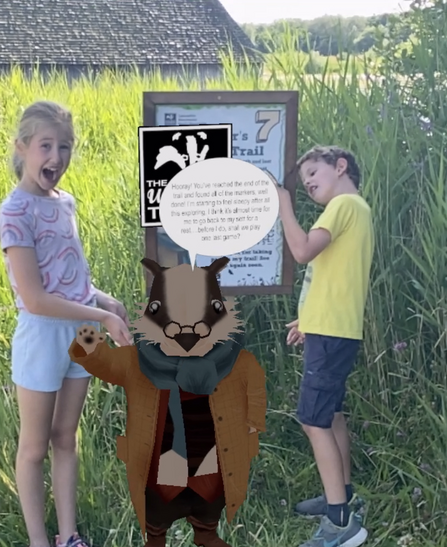
An app for all the family
We were thrilled to launch an innovative new app this year. Using AR technology, families can take a walk around Brockholes with Badger from The Wind in the Willows! Simply scan each QR code you find along the Badger Trail and he will appear, armed with some fascinating wildlife facts.
The app also features iNaturalist, which you can use to identify the wildlife you see, and the best of our Lancashire Wildlife Trust website including articles, our online shop and a place to become a member of the Trust.
The launch of The Bay
Morecambe Bay, like many coastal communities in the North West of England, has been impacted heavily by loneliness and isolation during the global pandemic, so when we received funding to launch a project called ‘The Bay: A Blueprint for Recovery’ in partnership with Cumbria Wildlife Trust, Eden Project North and Lancashire & South Cumbria NHS Foundation Trust, we couldn’t wait to get started.
By helping people to immerse themselves in activities including guided walks, rock pooling, beach cleans and art, we’re helping the communities of Wyre, Morecambe and Barrow-in-Furness to find much-needed solace in the natural world.

Bittern by Jamie Hall
A bumper year for breeding birds at Lunt Meadows
The pandemic certainly didn’t make it easy for us to survey the breeding birds at Lunt Meadows, but thanks to the efforts of many of our regular birders including Tony Conway, Peter Olson and Rob Williams, we were able to build an impressive picture.
Not only did we have breeding marsh harriers on the reserve, but breeding bitterns, the latter of which hadn’t bred in Sefton for centuries. Not only that, but our wetland breeding bird species rose from nine in 2012 to 24 in 2021, including avocets and black-headed gulls. Songbirds including whitethroats also raised young.
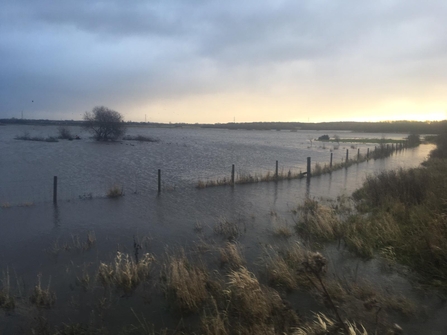
Flooding at Lunt Meadows by Adam Graham
Tackling the climate and nature crisis
Lunt Meadows also played a key role in protecting the local community from the effects of climate change. As well as nurturing wildlife as a nature reserve, Lunt Meadows is a valuable flood storage reservoir. During January’s Storm Christophe alone, the reserve saved more than 700 homes from being devastated by flood waters. It may have closed the reserve from February to June and induced some costly repairs, but this was miniscule in comparison to the millions of pounds of damage that would have been caused to homes – plus the mental strain on residents.
Lunt Meadows isn’t our only nature-based solution to the climate and nature crisis. Our carbon farm project in Winmarleigh is already producing fantastic data.
Our carbon farm began life as a boggy, unloved agricultural field that was actively leaking carbon into the atmosphere. Now, after we blocked the drainage ditches, created bunds, installed a solar-powered irrigation system and planted a permanent cover crop of sphagnum moss, there has been an 86 per cent decrease in carbon emissions! This is down to simply rewetting the peat, so we can’t wait to see how the site progresses as we restore it further.

Myplace wins HSJ Mental Health Innovation Award
Myplace winning ‘Mental Health Innovation of the Year’
Our green wellbeing project, Myplace, won the Mental Health Innovation of the Year award at this year’s Health Service Journal Awards! The team were delighted to receive such a highly sought after award and were thrilled to see the project’s passionate work recognised. Our Myplace Project Manager, Rhoda, said:
“The partnership between Lancashire and South Cumbria NHS Foundation Trust and The Wildlife Trust for Lancashire, Manchester and North Merseyside is really special and has always worked creatively to connect people with nature. These last 12 months though, keeping people connected to their local nature and communities has been critical. We're really proud of the determination and hard work of everyone involved.”
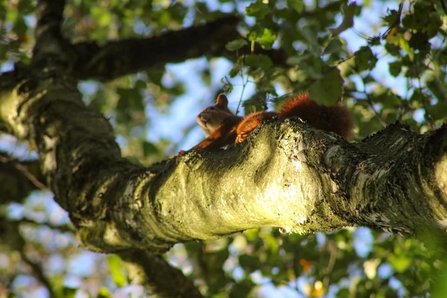
Red squirrel at Mere Sands Wood by Katie Cousins
Red squirrel success
We were so excited to see red squirrels return to four woodlands this year! They were sighted in Scarisbrick and Crosby, and were spotted at Mere Sands Wood for the first time since 2017. We hope this means their populations are beginning to recover and we’ll continue working to bring them back from the brink.
Our red squirrel team and volunteers also successfully hand-reared six orphaned reds back to health before returning them to the wild.

Floating Earth by Becky Royce
Floating Earth arriving at Pennington Flash
In November, something truly breath-taking came to Pennington Flash. ‘Floating Earth’ was a newly commissioned art installation by internationally renowned artist, Luke Jerram.
Luke is known all over the world for his innovative, large-scale artworks, and Floating Earth was no exception. The 10-metre planet Earth was projected with high-resolution imagery taken directly from NASA, and accompanied by passionate climate speeches and surreal tones reverberating from surrounding speakers. At night, the planet was illuminated, adding even more magic. Our CEO, Tom Burditt, captured the impact perfectly when he said:
“As I was looking at it, the perfect mirror image reflection of the Earth on the water’s surface got disturbed by the wind blowing across the lake, and so it made it look as if the polar ice cap was melting away from the Earth.”

Members of the Youth Council at COP26 in Glasgow
Our Youth Council taking over the world
2021 was a fantastic year for our Youth Council. They played a crucial role in our campaigns, including writing to local MPs about the issue of pesticides to support our Action for Insects work. And as the year rolled on, their achievements only grew, from appearing on BBC North West Tonight to promote the importance of peatlands to speaking on a global stage at COP26. We can’t wait to see what 2022 brings for this incredible group of young leaders.
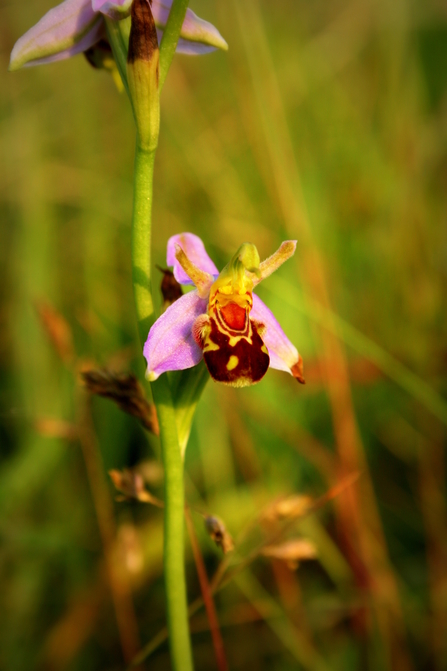
Bee orchid by Amy Pennington
Wilder sand dunes
We’re so proud of what our Fylde Sand Dunes team has achieved for nature this year, especially after 2020 proved to be such a difficult year. Welcoming people back to face-to-face events was a real highlight, and in total we engaged 856 people at our events. We were also able to host Beach School again, and helped 368 children to connect with the coast.
But our team didn’t stop there. Their dedicated conservation work really paid off this year, with a record number of orchids recorded on the dunes and St Anne’s Local Nature Reserve; our fourth sand lizard reintroduction brought the total to 412 lizards released over the past four years; and a record number of Christmas trees (more than 2,500!) were collected and recycled into the dunes to expand the dune system.
Despite the challenges posed by COVID-19 we’ve managed to come back even stronger, and we couldn’t be more grateful to our incredible staff, volunteers, members, donors and supporters for their help.

